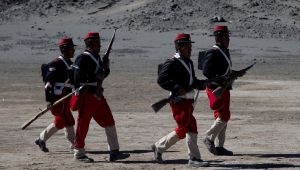BEIRUT -- Two pieces of good news in the last two days should usher in a quiet few months in the Middle East. They are the joint visit to Beirut Friday by the Saudi and Syrian leaders for a summit-lunch with their Lebanese counterparts, as part of Saudi Arabian King Abdullah‘s trip to four Arab countries; and, the Iranian and American announcements that they would resume negotiations on nuclear issues in September. Slightly less dramatic but noteworthy also was the Arab League's acceptance in principle to support moving to direct Israeli-Palestinian negotiations (from the current indirect "proximity talks") if Israel and the US accepted certain negotiating principles -- suggesting that the Arabs collectively may have some backbone and something of a strategy for a negotiated peace settlement.
The joint Saudi-Syrian visit to Beirut is big news in Middle Eastern terms, because within the Arab World Syria and Saudi Arabia represent the heart, soul, mind, and wellspring of the two camps in this region that have fought a fierce ideological war for the past decade or so. In their very different ways, the Saudis and Syrians have real impact around the region. When they confront each other, usually through proxies in Lebanon, Palestine and other places, the Middle East region drifts into greater tension and violence. When they find common cause, they both benefit and the region quiets down for a while.
The visit of King Abdullah and Syrian President Bashar Assad to Beirut is important because Lebanon remains the mother of all proxy wars -- the fulcrum of all major conflicts in the region and even a bit beyond, at six different levels, at least: domestically among Lebanese; between Syrians and Lebanese; between various Arabs allied with and headed by Syria and Saudi Arabia; between many in the Arab world and Iran; between those who want to make war or peace with Israel; and, between the Iranian-Syrian-led grouping of Arabs (including Hizbullah and Hamas) and the United States.
The Syrian-Saudi visit to keep things quiet in Lebanon is an upgraded version of the Qatari-led and Arab League-mandated diplomatic move in May 2008 to contain and end the brief street fighting that broke out in Beirut that month and threatened to rip apart the country along Sunni-Shiite lines. (Though the core problem in Lebanon of how an Iranian-Syrian-allied armed Hizbullah can coexist with the Lebanese state machinery remains untouched, and will rear its head again soon).
Now as in May 2008, the five major players in the region (Saudi Arabia, Syria, Iran, the United States and Turkey) feel that further warfare serves nobody, and hurts everybody. If the United States and Iran negotiate a reasonable agreement on a peaceful Iranian nuclear program, and the Syrians and Saudis help keep Lebanon quiet, this means that two principal causes of conflict in the Middle East are being dampened down.
Two other principal regional conflict drivers -- foreign armies in our midst and the Arab-Israeli conflict -- remain unaddressed. The Israelis are conspicuously absent from this week's developments, accurately reflecting their reality as outsiders in the region who remain hostile to Palestinian and Arab rights and continue to rely mainly on their military power to protect themselves or assert their regional strategic aims. They have not only alienated all the Arabs, but now also Turkey and Iran.
The bad news, however, is that this week's positive flashes are just that -- fleeting flashes amidst a wider, deeper malaise across the region. Profound indigenous tensions persist in Lebanon, Palestine, Yemen, Sudan, Somalia, Iraq with varying degrees of daily violence or national fragmentation. The entire region, without exception, chronically and structurally suffers from the problems that accompany long-term autocracy, lack of democracy, erratic human rights conditions, worsening economic disparities, and a sense of vulnerability and helplessness among most Arab nationals who do not enjoy the full rights of citizenship in their own countries. These deeper underlying pressures are due primarily to Arab leadership legacies, but are also compounded by the factors of Israel and Western armies and power politics. They create unstable conditions that in turn translate into pervasive corruption, mismanagement, abuse of power, wars, insurrections and a range of political violence, including terrorism at home and abroad.
The Saudi-Syrian lunch in Beirut is a positive and welcomed move that should keep things quiet for some months. Long-term, structural stability in this entire region will remain elusive, however, as long as domestic governance remains non-democratic, citizenship rights remain imprecise, security agencies remain all-powerful, human rights remain exotic, economic conditions remain volatile and polarized, foreign armies march around or establish bases nearly at will, and Israel continues to practice 19th Century-style settler-colonialism without hindrance. We should celebrate the good news this week while not losing sight of the underlying problems that plague our societies.
Rami G. Khouri is Editor-at-large of The Daily Star, and Director of the Issam Fares Institute for Public Policy and International Affairs at the American University of Beirut, in Beirut, Lebanon.
Copyright © 2010 Rami G. Khouri - distributed by Agence Global
Khouri, Rami. “Novel Good News, Same Old Bad News.” Agence Global, July 30, 2010





